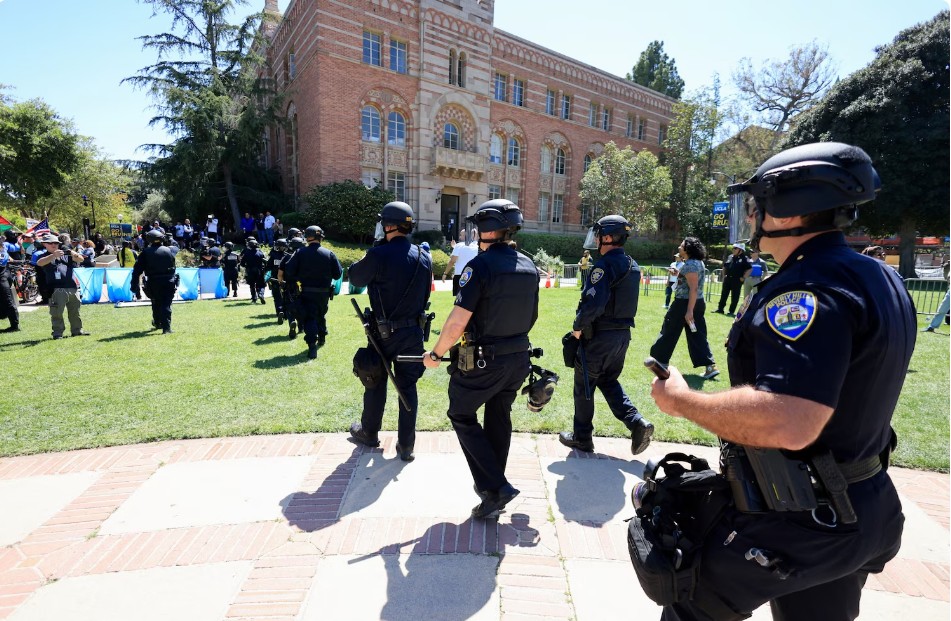
The first day of an expected two-week bench trial challenging the Trump administration’s efforts to deport international students and scholars who express pro-Palestinian views began Monday in Boston with the question of noncitizens’ First Amendment rights.
The lawsuit was filed by the American Association of University Professors and the Middle East Studies Association, which represents hundreds of professors and students across the country.
While recent efforts to deport high-profile international students like Mahmoud Khalil and Rümeysa Öztürk have been found unconstitutional and temporarily thwarted in federal courts, the Trump administration has continued removal proceedings against them.
This case names Secretary of State Marco Rubio as a defendant and challenges his invocation of several provisions of the Immigration and Nationality Act, including a rarely invoked provision used to deport immigrants whose presence in the U.S. is deemed a threat to foreign policy interests.
Ramya Krishnan, an attorney representing the academic groups, argued that the government has “adopted a policy of ideological deportation” and is chilling the speech of students and professors alike. As evidence, Krishnan said they will call on professors and academics who say they feel at risk of deportation over their pro-Palestinian teachings or views.
During the opening statement, Krishnan also pointed at several social media posts by Trump officials, including Rubio’s X post commenting on Khalil’s arrest that said, “We will be revoking the visas and green cards of Hamas supporters in America so they can be deported.”
“In a litany of statements … officials have referenced and reaffirmed the policy,” she said. “They have also made clear that they deem a broad spectrum of pro-Palestinian and anti-war speech to be pro-Hamas and antisemitic.”
U.S. District Judge William Young interrupted Krishnan’s statements on several occasions to question if she believed he had the right to challenge Rubio’s wide-ranging discretion to invoke the provisions of the law.
“Are you asking me to declare that the conduct of these public officials, including the Secretary of State, is unconstitutional?” the judge asked.
“That is correct,” Krishnan responded.
“Well, then I’ve got this problem. If that’s what you’re asking, your people, your litigants, your clients, haven’t challenged it, have they?” he pressed.
“So to be clear, your honor, we do not challenge the constitutionality of the foreign policy provision directly. What we challenge is a policy of relying on a variety of INA provisions in order to deport noncitizen students and faculty based on their political viewpoint,” she said.
DOJ attorney Victoria Santora pushed back on accusations that the administration is targeting students for constitutionally protected speech.
“The government’s evidence will show that these legal authorities have existed for decades and that their purpose is to promote safety and security,” Santora said. “The reality is that is the prerogative of each administration to set immigration enforcement priorities.”
But before she could deliver the government’s opening statement, Judge Young asked if the public officials she is representing believe that noncitizens who are lawfully in the country have the same rights under the First Amendment as citizens.
When she wavered on her answer, Judge Young pressed again.
“Our position would be that the First Amendment does refer to persons and that people in the United States share the same rights under the First Amendment,” Santora said.
“Thank you, that’s an answer and I’ll hold you to that and please go ahead,” Judge Young responded.
However, a few minutes later Santora backtracked — adding that there were “nuances to the First Amendment.”
“The nuance is that, as I addressed in our opening statement, this context involves issues of national security, foreign policy, immigration enforcement and enforcement discretion,” she said.
Attorneys for the plaintiffs proceeded to call to the stand several noncitizen professors who have expressed fear of being retaliated against for their previous speech or teachings.
Government officials are expected to be among other witnesses called in the next few days.